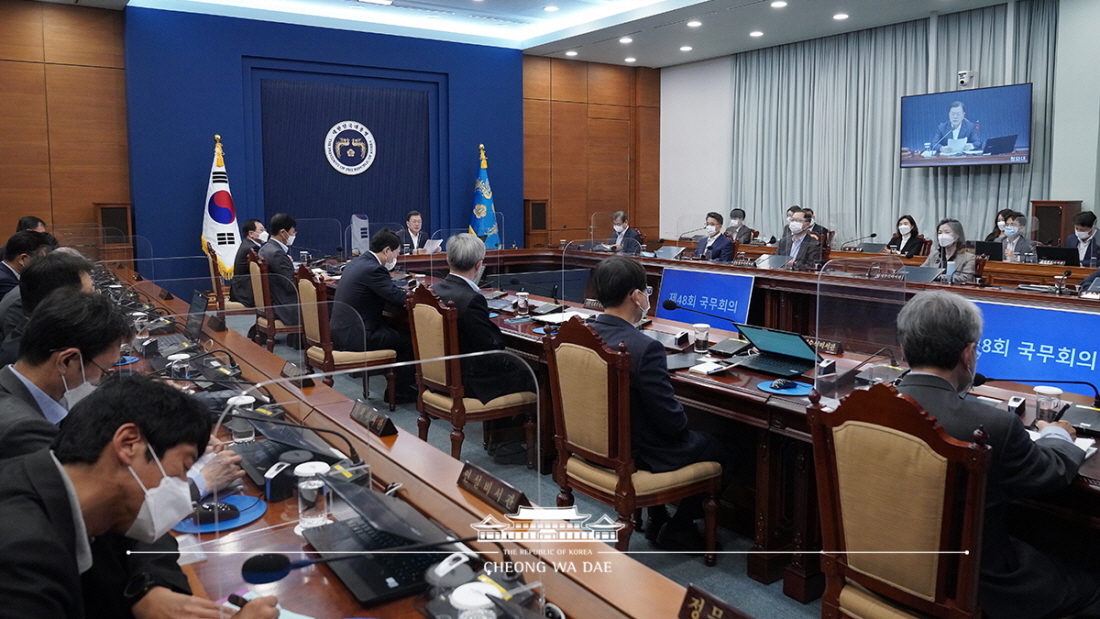이 웹사이트는 제19대 대통령 임기 종료에 따라 대통령기록관이 「대통령기록물 관리에 관한 법률」에 의해 이관받아 서비스하는 대통령기록물입니다. 자료의 열람만 가능하며 수정 · 추가 · 삭제는 불가능합니다.
다만, 「개인정보보호법」에 의하여 개인의 정보를 보호받기 원하시는 분은 관련 내용(요청자, 요청내용, 연락처, 글위치)을 대통령 웹기록물 담당자(044-211-2253)에게 요청해 주시면 신속히 검토하여 조치해 드리겠습니다. 감사합니다.
SPEECHES & REMARKS
BRIEFINGS

Let me begin the 48th Cabinet Meeting.
As of today, there are exactly six months left before the end of my Administration. Until the last day, the Government will concentrate solely on people’s livelihoods and do everything possible to bring about full recovery. We will prepare for the country’s future in step with the rapidly changing era of great transformation and enhance our responsibility to the international community as an advanced nation.
The schedule for my recent nine-day visit to Europe was demanding , but it has resulted in considerable outcomes. I could truly sense the more elevated status of Korea and reaffirmed the international community’s support for peace on the Korean Peninsula. World leaders gave high marks to our exemplary anti-epidemic efforts, economic recovery and successful achievements in the cultural sector. They also praised our upgrading of Nationally Determined Contributions and determination to overcome the climate crisis as well as our leading role as a bridge between advanced and developing countries.
We were able to expand cooperation in a wide range of areas, including batteries, electric vehicles and new and renewable energy. Moreover, commitments were gathered for a joint response to the supply chain uncertainties that are looming large as a great risk to the world economy. We also significantly expanded the scope of economic cooperation with the Visegrád Group to include such areas as science and technology, energy and infrastructure. The Group, comprising Hungary, the Czech Republic, Slovakia and Poland, has the most dynamic growth in Europe and is emerging as one of Korea’s largest investment destinations.
Many countries wanted to learn about our successful experiences and expressed a desire for cooperation. Korea is already a country admired and envied by the world. All of this is a national accomplishment achieved by our people. They also deserve their fair share of the resulting pride. The Government will redouble its efforts to ensure that our heightened national prestige will lead to improvements in the people’s quality of life.
With a phased return to normalcy going into effect, people’s everyday lives are regaining vitality. We could confidently move to recover daily routines because everyone has worked hard to help stabilize the anti-epidemic situation and raise vaccination rates. Numerous countries are suffering once more after starting to return to normal. However, the Government will do everything it can to manage the situation, so we can move toward a complete recovery of daily routines without stepping backward.
Living with COVID-19 – daily routines as they are now – is totally different from the past. While striking a balance between anti-epidemic efforts and vaccinations, the economy and people’s livelihoods, everyone needs to exercise more restraint amid greater autonomy and fulfill their responsibilities. Regardless of the circumstances, we have to strictly comply with fundamental epidemic prevention rules, and the need for vaccinations is growing more important. A return to normalcy is ultimately something we make on our own. If we all join forces with a mature community spirit – as we have done so well so far – we will be able to create a successful model for a return to daily routines as well and round out Korea’s response to COVID-19.
Disruptions in the supply of urea water solution have become an urgent, pending issue. The Government is making all-out efforts to secure overseas supplies by mobilizing all diplomatic capabilities. The surplus in the public sector will be used where it is most needed first, and we will do everything we can to stabilize supply and demand through emergency control measures. The Government is doing everything possible to secure alternative import sources and quickly resolve import delays, so I ask our people to avoid having undue anxiety.
Due to changes in the industrial environment – the international division of labor faltering, logistical bottlenecks forming and the transition to a low-carbon economy accelerating – supply chain instabilities have become a risk factor that can occur at any time. We have to take this as an opportunity to monitor problems with the supply and demand of raw materials more extensively as global supply chains are reorganized.
I urge you to conduct thorough preliminary investigations and establish meticulous management systems for imported items that come predominantly from a few specific countries. So far, our attention has been focused primarily on strategic materials in high tech fields, but I would like you to broaden the scope of management to include items closely related to everyday life, thereby devising various measures such as diversifying import sources, achieving technological self-sufficiency and encouraging domestic production.
I also ask you to prepare thoroughly against factors causing price instability – rising global energy costs and supply bottlenecks. Inflation rates are soaring around the world – over 5 percent in the United States, 10 percent in China and 4 percent in the Eurozone. We will do all we can to achieve this year’s goal which is to keep the inflation rate within the 2 percent range. Following the freeze on public utility charges and the expansion of supplies of agricultural, livestock and marine products, the fuel tax will be decreased by 20 percent, starting this week. I urge each ministry and agency to do everything in their means with the mindset that keeping price stability is the first step toward stabilizing the people’s livelihoods.



